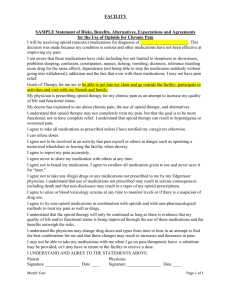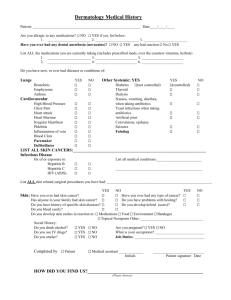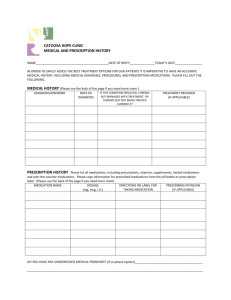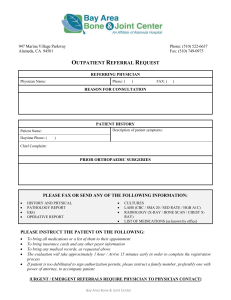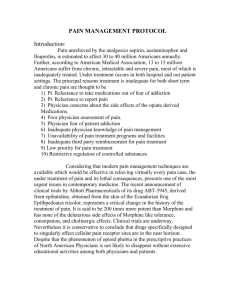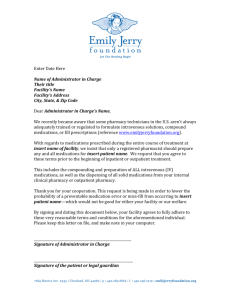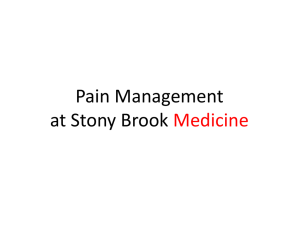Medication Contract
advertisement
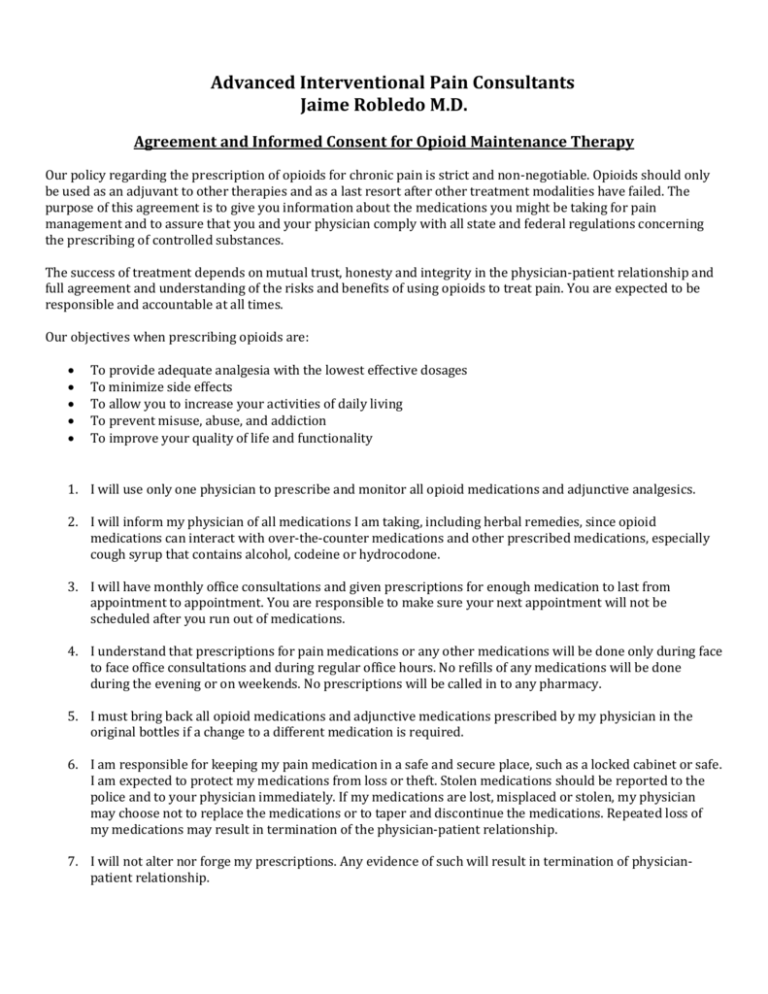
Advanced Interventional Pain Consultants Jaime Robledo M.D. Agreement and Informed Consent for Opioid Maintenance Therapy Our policy regarding the prescription of opioids for chronic pain is strict and non-negotiable. Opioids should only be used as an adjuvant to other therapies and as a last resort after other treatment modalities have failed. The purpose of this agreement is to give you information about the medications you might be taking for pain management and to assure that you and your physician comply with all state and federal regulations concerning the prescribing of controlled substances. The success of treatment depends on mutual trust, honesty and integrity in the physician-patient relationship and full agreement and understanding of the risks and benefits of using opioids to treat pain. You are expected to be responsible and accountable at all times. Our objectives when prescribing opioids are: To provide adequate analgesia with the lowest effective dosages To minimize side effects To allow you to increase your activities of daily living To prevent misuse, abuse, and addiction To improve your quality of life and functionality 1. I will use only one physician to prescribe and monitor all opioid medications and adjunctive analgesics. 2. I will inform my physician of all medications I am taking, including herbal remedies, since opioid medications can interact with over-the-counter medications and other prescribed medications, especially cough syrup that contains alcohol, codeine or hydrocodone. 3. I will have monthly office consultations and given prescriptions for enough medication to last from appointment to appointment. You are responsible to make sure your next appointment will not be scheduled after you run out of medications. 4. I understand that prescriptions for pain medications or any other medications will be done only during face to face office consultations and during regular office hours. No refills of any medications will be done during the evening or on weekends. No prescriptions will be called in to any pharmacy. 5. I must bring back all opioid medications and adjunctive medications prescribed by my physician in the original bottles if a change to a different medication is required. 6. I am responsible for keeping my pain medication in a safe and secure place, such as a locked cabinet or safe. I am expected to protect my medications from loss or theft. Stolen medications should be reported to the police and to your physician immediately. If my medications are lost, misplaced or stolen, my physician may choose not to replace the medications or to taper and discontinue the medications. Repeated loss of my medications may result in termination of the physician-patient relationship. 7. I will not alter nor forge my prescriptions. Any evidence of such will result in termination of physicianpatient relationship. 8. I will not give or sell my medications to any other person under any circumstances. If I do, I may endanger that person’s health. It is also against the law. Any evidence of such may result in termination of the physician-patient relationship. 9. I will use my medication only as prescribed. I will not take more than the amount indicated by my physician. Any evidence of such may result in termination of the physician-patient relationship. 10. Evidence of acquisition of any opioid medication or adjunctive analgesia from other physicians (which includes surgeons and emergency rooms), may result in termination of the physician-patient relationship, unless specifically authorized by my physician. 11. I will not share my opioid medications with anyone. I will not hoar opioid medications nor will I use leftover medications from other physicians. Any evidence of such may result in termination of the physician-patient relationship. 12. I will not use any illicit substances, such as cocaine, marijuana, etc. while taking these medications. This will result in a change to your treatment plan, including safe discontinuation of your opioid medications when applicable or complete termination of the physician-patient relationship. 13. The use of alcohol and opioid medications is contraindicated. 14. I agree and understand that my physician reserves the right to perform random or unannounced urine drug testing. If requested to provide a urine sample, I agree to cooperate. If I decide not to provide a urine sample, this will represent ground for termination of the physician-patient relationship. The presence of a non-prescribed drug (s), illicit drug (s) or alcohol in the urine can be grounds for termination of the physician-patient relationship. Urine drug testing is done as a diagnostic and monitoring tool and in accordance with legal and regulatory principles on the use of controlled substances to treat pain. 15. If my prescription is not refilled, I might experience withdrawal syndrome. This means I may have any or all of the following: runny nose, yawning, large pupils, goose bumps, abdominal pain and cramping, diarrhea, irritability, aches throughout my body and a flu-like feeling. I am aware that opioid withdrawal is uncomfortable but not life threatening. I may choose to seek medical attention at an emergency room. 16. I am aware that the use of opioid has been associated with the following risks: Misuse, abuse and addition. The risk to misuse or abuse opioid medications will be assessed at the beginning and during the course of treatment. Life-threatening respiratory depression, especially in elderly, debilitated or patients with chronic lung disease. Closer monitoring may be required. Accidental exposure to children or close contacts with the potential of fatal overdose. Interaction with alcohol with the potential of fatal overdose. 17. Physical dependence and/or tolerance can occur with the use of opioid medications. Physical dependence means that if the opioid medication is abruptly stopped or not taken as directed, a withdrawal syndrome can occur. This is a normal physiological response. The withdrawal syndrome could include, but not exclusively, sweating, nervousness, abdominal cramps, diarrhea, goose bumps, palpitations, insomnia, and alterations in one’s mood. Physical dependence does not equal addiction. Addiction is a primary, chronic neurobiologic disease with genetic, psychosocial and environmental factors influencing its development and manifestation. It is characterized by behavior that includes one or more of the following: impaired control over drug use, compulsive use, continued use despite harm, and cravings. This means the drug decreases one’s quality of life. The development of addiction is more common in a person who has family or personal history of addiction. I agree to disclose my complete and honest drug history and that of my family to the best of my knowledge. Tolerance means a state of adaptation over time in which the same dose of a drug does not produce the same analgesic effect. The dose of the opioid may have to be titrated up or down to a dose that produces maximum function, be switched to a different opioid, or stopped completely. 18. If I have a history of alcohol or drug misuse, abuse, or addiction, I will notify the physician of such history since the treatment with opioids for pain may increase the possibility of relapse. A history of addiction does not, in most instances, disqualify one for opioid treatment of pain, but starting or continuing a program for recovery is a must. 19. I am aware that the use of opioid has been associated with the following side effects: Sleepiness and drowsiness Nausea Vomiting Constipation Urinary retention Dizziness Itching Allergic reactions Slow breathing / Slow reflexes and reactions time Low testosterone levels in males 20. If the medication causes dizziness, sedation or drowsiness, I understand I must not drive a motor vehicle or operate machinery that could put my life or someone else’s life in jeopardy. 21. I agree to allow my physician to contact any health care professional, family member, pharmacy, legal authority, or regulatory agency to obtain or provide information about your care or actions if the physician feels it is necessary. 22. I agree to a family conference or a conference with a close friend or significant other if the physician feels it is necessary. 23. If I violate this agreement, my doctor may discontinue treatment immediately. If the physician-relationship is terminated, I will receive a 30 day-supply of my medications and a list of other providers in the area. I will not receive any additional medications if my doctor considers that the continuation of their use may pose a higher risk to my health or is against state or federal rules and principles. 24. I have read this contract or have it read to me. I understand all of it. I have had the chance to have all of my questions regarding this treatment answered to my satisfaction. By signing this form voluntarily, I give Dr. Jaime Robledo my consent for the treatment of my pain with opioid medications if he considers these medications appropriate for my care. Patients Name: ____________________________________________ Witness Name: ______________________________________________ Patients Signature: _______________________________________ Witness Signature: __________________________________________ Pharmacy: __________________________________________ Phone #: _________________________ Date: ___________________________
